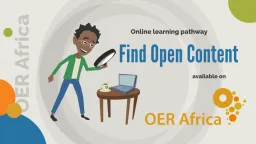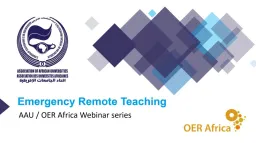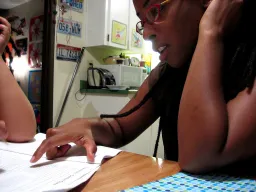Explore the dynamic world of Open Educational Resources and discover how OER Africa is driving the movement forward. This page is divided into two sections:
Articles: Our articles aim to deliver insights on OER-related themes that inform, spark conversation, and engage with the developing open education landscape, with a particular focus on Africa.
Updates: Below, the articles, you'll find updates on OER Africa’s latest initiatives, activities, and contributions to the OER community.
Articles
This section features targeted articles crafted specifically for educators, students, and the global Open Educational Resources (OER) community. The articles examine themes related to OER, offering insightful perspectives and information. The content seeks to inform, prompt discussion, and actively engage with the dynamic landscape of open education, particularly within the African context.

Following adoption of the UNESCO Open Educational Resources (OER) Recommmendation, UNESCO launched the Dynamic Coalition for the OER Recommendation on 2 March 2020

While many educators appreciate the value of openly licensed content, the issue is how to find these resources. OER Africa has prepared an interactive, multimedia rich, learning pathway on just this topic. It identifies a suggested simple set of procedures to find open resources that align with your curriculum requirements.

Trying to work out how to best teach your students during university shutdowns due to the COVID-19 crisis? Sign up for a webinar series on Emergency Remote Teaching, hosted by the Association of African Universities (AAU) and OER Africa. Register here.

World Book and Copyright Day on 23 April is a celebration to promote the enjoyment of books and reading. Now that so many of us are at home with our children because of COVID-19, we can explore the virtual world of children’s stories – all free to read and many openly licensed. Some wonderful book and reading resources are listed below.

This week, OER Africa shares some resources we consider useful for institutions in the midst of current restrictions of movement and the requirements to introduce remote teaching in many countries due to the COVID-19 pandemic. We have selected resources for universities, school management teams, mathematics, reading and writing, as well as our most popular downloads over the past six months.

As the COVID-19 pandemic has spread, millions of learners and educational institutions globally have had to make rapid, unforeseen changes to how they run their learning programmes. Face-to-face teaching and learning have become impossible in many countries and there is uncertainty over when educational institutions will reopen their doors. This may have long-term effects on school programmes, examinations, and most importantly, learning.
Updates
This section provides updates on OER Africa’s initiatives and activities. Stay informed about our contributions to the OER community and how we are driving the open education movement forward.

Saide's OER Africa consultant, Brenda Mallinson, will be running a session together with Shadrack Mbogela from the Open University of Tanzania on "Exploring the Digital Fluency course for Academic staff Professional Development" at the e/merge Online Festival.

Discover ten key facts about open educational resources (OERs) in an easy to digest format. Each fact is supplemented with links to worldwide resources extending and deepening the core idea.

Exploring Aspects of Digital Fluency for Blended Teaching and Learning. Workshop presentation by Brenda Mallinson to The First Annual Teaching and Learning Conference 2018 at North West University, South Africa. The workshop was on the digital fluency course developed together with the Open University of Tanzania.

London School of Economics Press has launched the latest in a succession of new university press initiatives and one that will support the development of high-quality, academic-led, open access publications in the social sciences. Kieran Booluck provides details of the first LSE Press journal and outlines plans for the press to pursue more innovative publications and experiment with new types of content.

COL has identified the development of OER as a potential answer to the challenges of access to relevant learning resources to ensure inclusive and equitable quality education. Provincial/regional OER policies and guidelines were developed in Sri Lanka, Botswana, and Cameroon involving provincial/regional education policymakers.

The Open Pedagogy Notebook has been set up by Rajiv Jhangiani from Kwantlen Polytechnic University in British Columbia and Robin deRosa from the Plymouth State University in New Hampshire. They are encouraging online submissions of examples of open pedagogical practices from practioners throughout the world.
